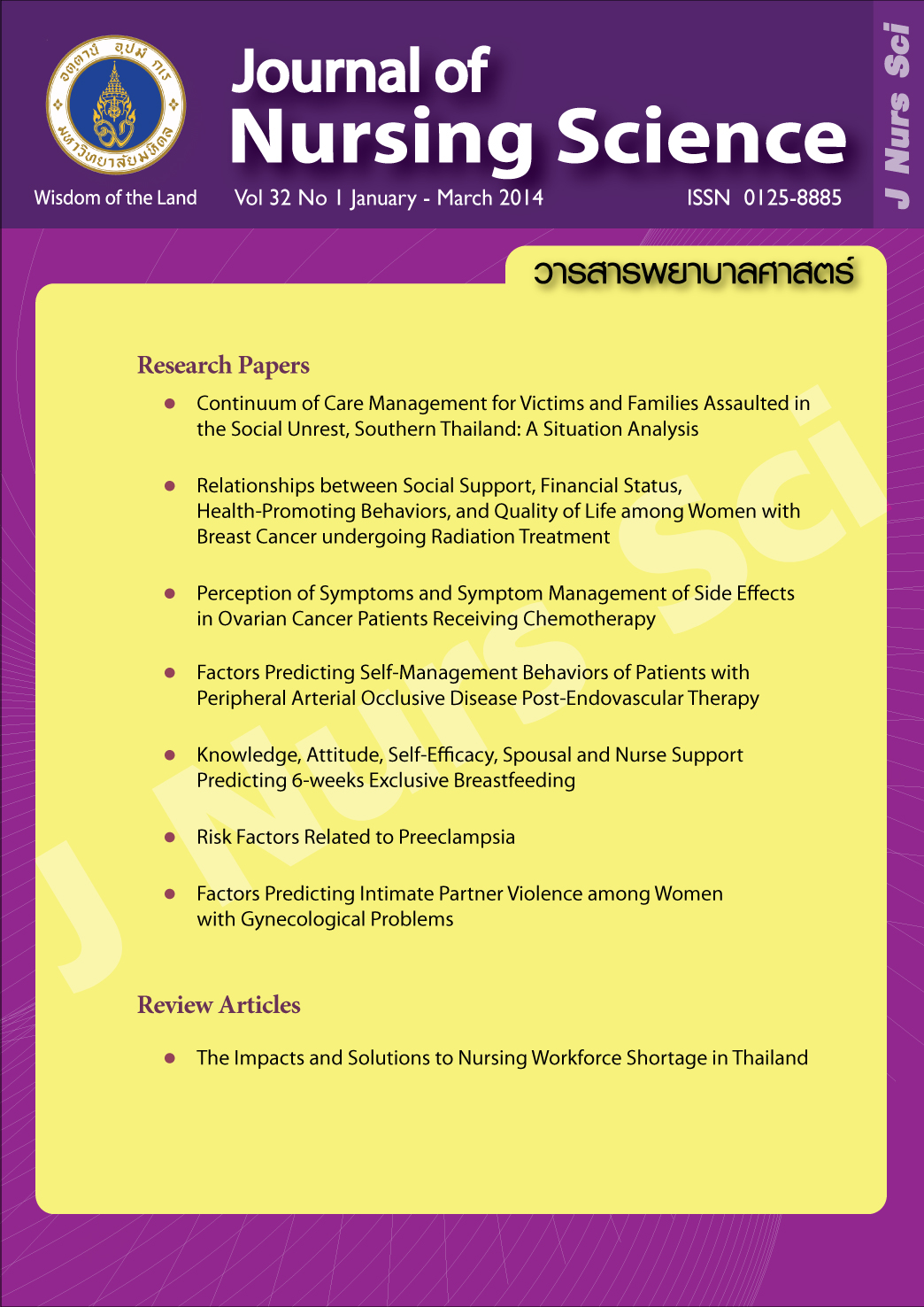The Impacts and Solutions to Nursing Workforce Shortage in Thailand
Main Article Content
Abstract
Nursing workforce shortage in Thailand is one of the most unsolved national problems and continues to increase intensity due to several factors. For examples, there are changing population structure to be an aging society, increasing advanced medical technologies, and increasing intensity and complexity pattern of population illness. Moreover, Thai health policies are aimed to increase patients’ access to care and to promote Thailand to be a medical hub in Asia and the ASEAN Economic Community. On the other hands, the government policy in reducing the production of nurses impeded nursing professional employment. Nursing shortage affected not only nurses but also patients, organizations, society, and the nation as well. To better solve this problem, Thailand Nursing and Midwifery Council proposed policy and guidelines for increasing production of nurses, reducing nurses’ turnover, and increasing retention of nurses. To implement the proposed policy successfully, it requires collaboration from nursing administrators who are responsible in management of nursing workforce. It involves appropriate staffing, incentives, and other strategies to help retain professional nurses. Nursing faculty should pay more attention and effort on enhancing positive attitudes toward nursing profession in nursing students. Moreover, further studies on nursing workforce should be conducted. Professional nurses should be empowered to have positive attitudes toward nursing profession, to identify their career goals, and to continue their professional development.
ผลกระทบและทางออกของการขาดแคลนกำลังคนทางการพยาบาลในประเทศไทย
อรุณรัตน์ คันธา
บทคัดย่อ:
การขาดแคลนกำลังคนทางการพยาบาลในประเทศไทย เป็นปัญหาระดับชาติที่มีมาอย่างต่อเนื่องและรุนแรงมากขึ้น เนื่องจากปัจจัยต่างๆ เช่น การเปลี่ยนแปลงโครงสร้างประชากร โดยเฉพาะการเพิ่มจำนวนของผู้สูงอายุ ความก้าวหน้าทางเทคโนโลยีทางการแพทย์ การเปลี่ยนแปลงแบบแผนความเจ็บป่วยที่มีความรุนแรงและซับซ้อนมากขึ้น นโยบายระบบบริการสุขภาพที่ทั่วถึงครอบคลุมประชาชนทุกคน และการตั้งเป้าหมายให้ประเทศไทยเป็นศูนย์กลางทางการแพทย์ในภูมิภาคเอเชีย ตลอดจนความท้าทายในการแข่งขันด้านคุณภาพการพยาบาลจากการเปิดประชาคมเศรษฐกิจอาเซียน ขณะเดียวกันในอดีตรัฐบาลมีนโยบายลดจำนวนการผลิตของพยาบาลวิชาชีพ อีกทั้งข้อจำกัดในการจ้างงานของพยาบาลวิชาชีพ สาเหตุดังกล่าวส่งผลกระทบต่อพยาบาลวิชาชีพ ผู้ป่วย องค์การ สังคม และประเทศชาติอย่างมากมาย ข้อเสนอแนะแนวทางการแก้ไขปัญหาเชิงนโยบายจากสภาการพยาบาลในเรื่องการผลิตเพิ่มพยาบาลวิชาชีพ การลดการสูญเสียพยาบาลวิชาชีพ รวมทั้งการเพิ่มการธำรงรักษาพยาบาลวิชาชีพนั้นถือเป็นแนวทางที่ดีในการแก้ไขปัญหาการขาดแคลนกำลังคนทางการพยาบาล การที่จะทำให้นโยบายหรือแนวทางที่สภาการพยาบาลเสนอนั้นประสบความสำเร็จ ต้องเน้นความมีส่วนร่วมระหว่างผู้บริหารทางการ
พยาบาลซึ่งมีหน้าที่หลักในการบริหารจัดการอัตรากำลังพยาบาลให้มีความเหมาะสม และจูงใจผู้ใต้บังคับบัญชาให้คงอยู่ในวิชาชีพ ส่วนอาจารย์พยาบาลควรเน้นในเรื่องของการสร้างทัศนคติที่ดีต่อวิชาชีพแก่นักศึกษาพยาบาล และงานวิจัยเกี่ยวกับกำลังคนทางการพยาบาล และสำหรับพยาบาลปฏิบัติการควรมีทัศนคติที่ดี กำหนดเป้าหมาย และพัฒนาตนเองอย่างต่อเนื่องในวิชาชีพพยาบาล
คำสำคัญ: การขาดแคลนกำลังคนทางการพยาบาล กำลังคนทางการพยาบาล พยาบาลวิชาชีพ การธำรงรักษา
Article Details
Copyright Notice: Nursing Science Journal of Thailand has exclusive rights to publish and distribute the manuscript and all contents therein. Without the journal’s permission, the dissemination of the manuscript in another journal or online, and the reproduction of the manuscript for non-educational purpose are prohibited.

Disclaimer: The opinion expressed and figures provided in this journal, NSJT, are the sole responsibility of the authors. The editorial board bears no responsibility in this regard.


